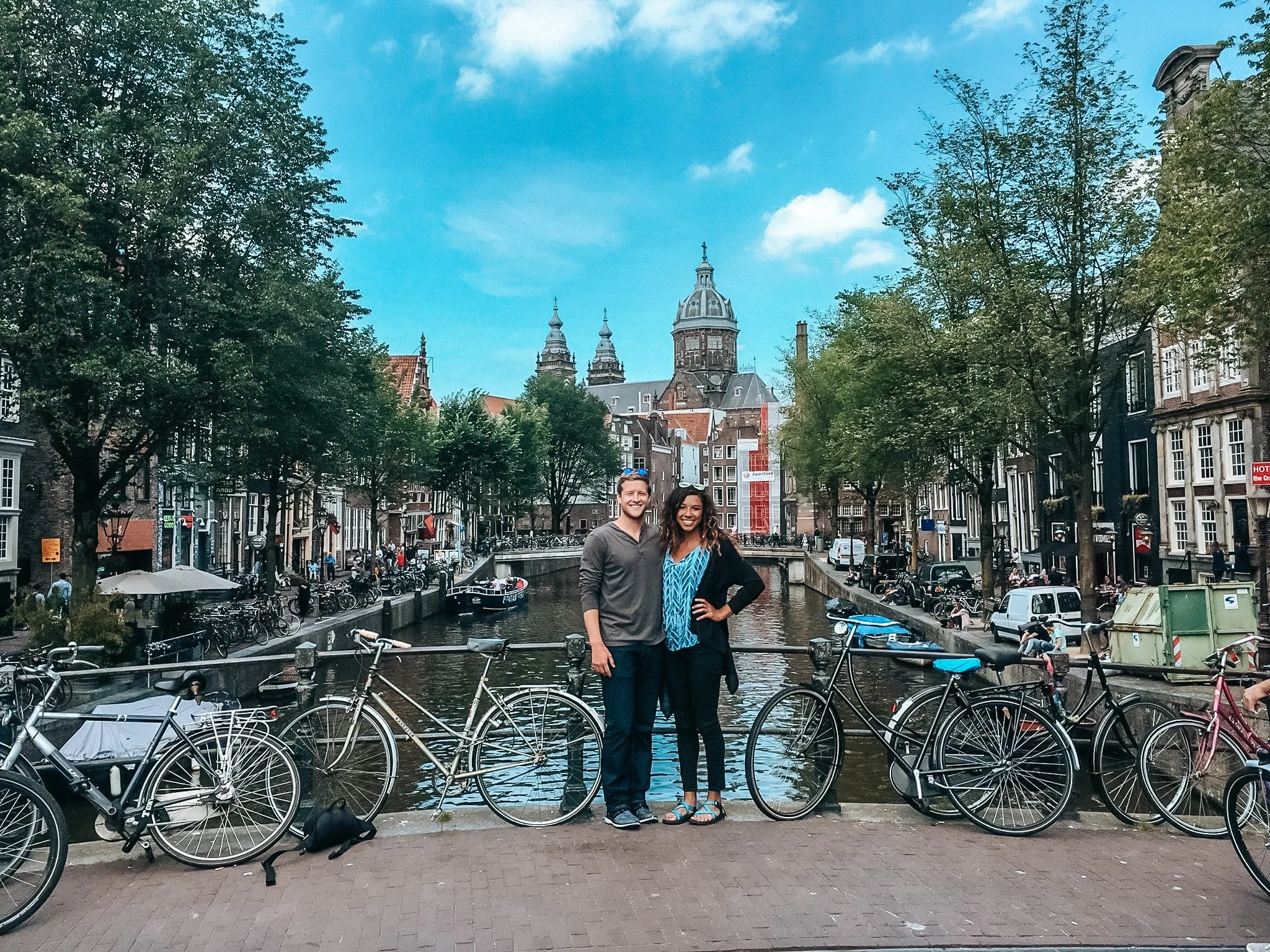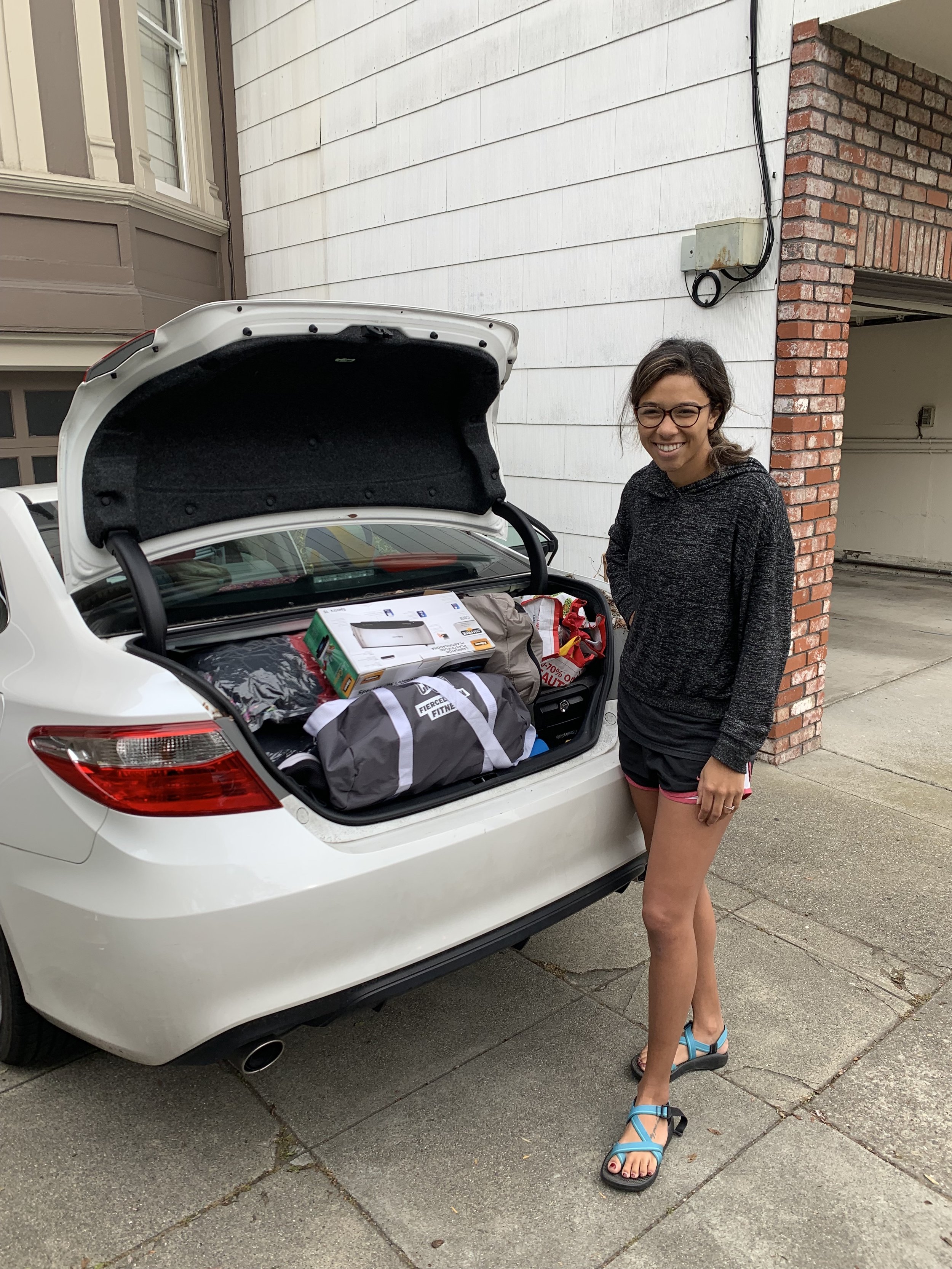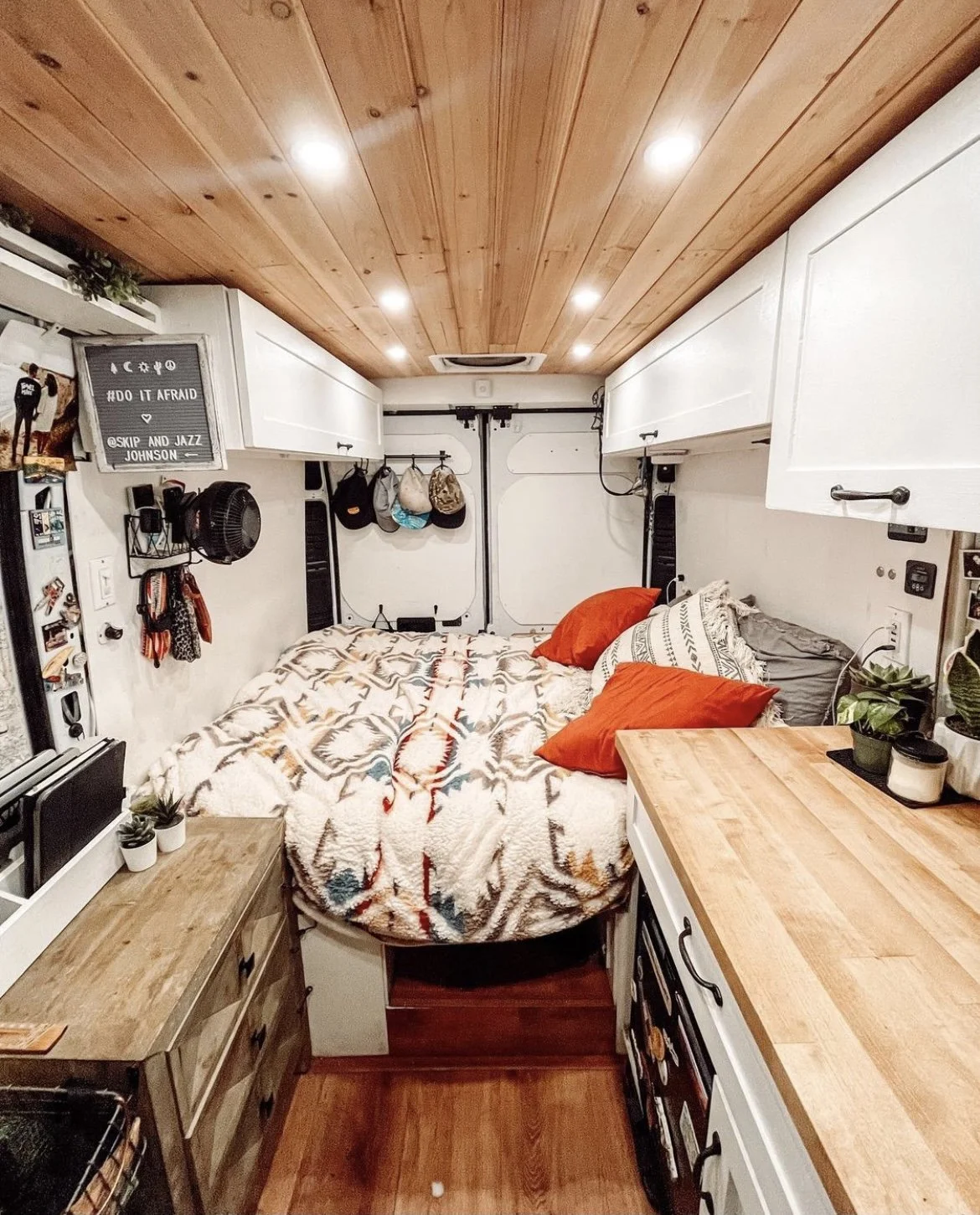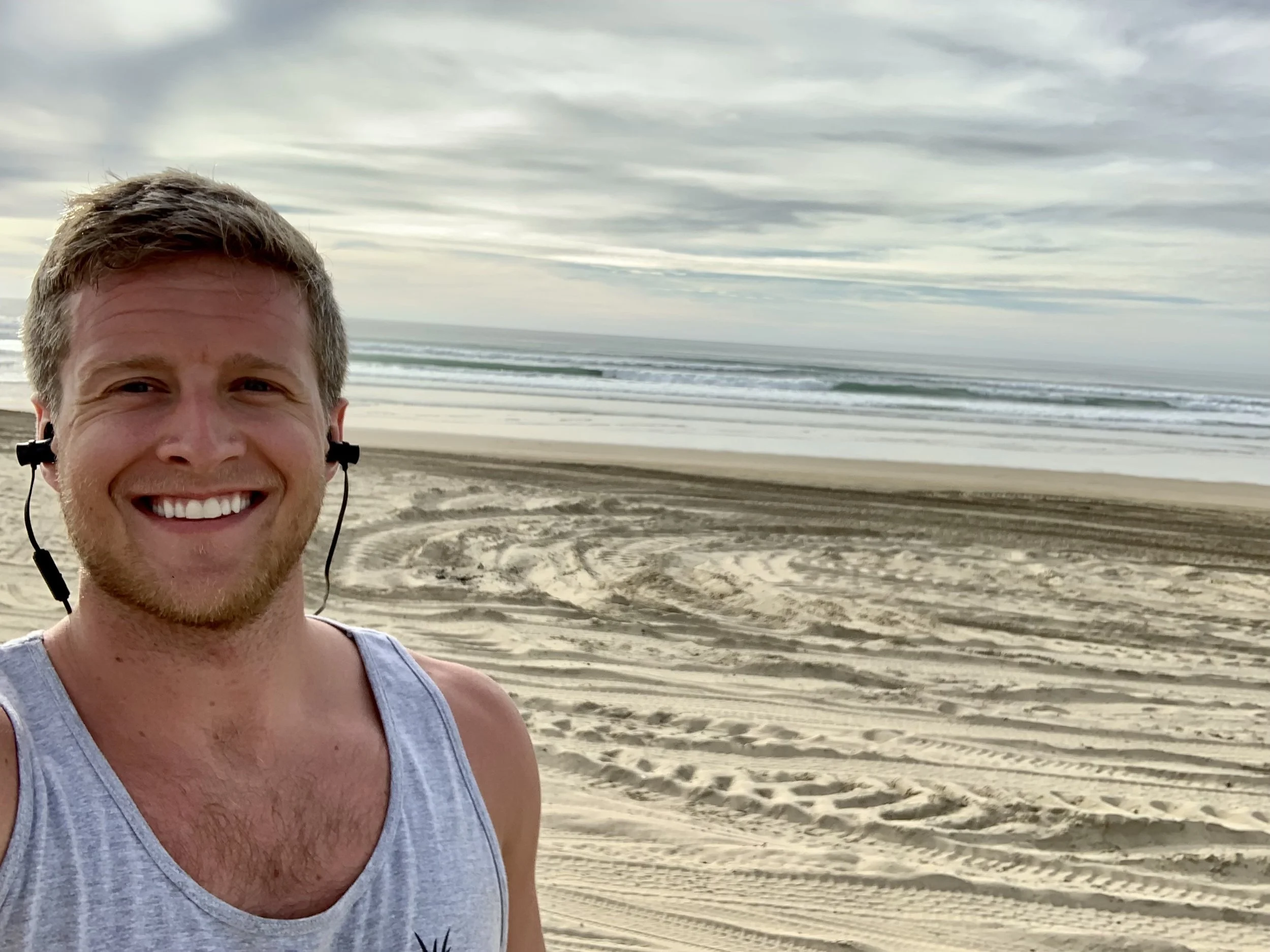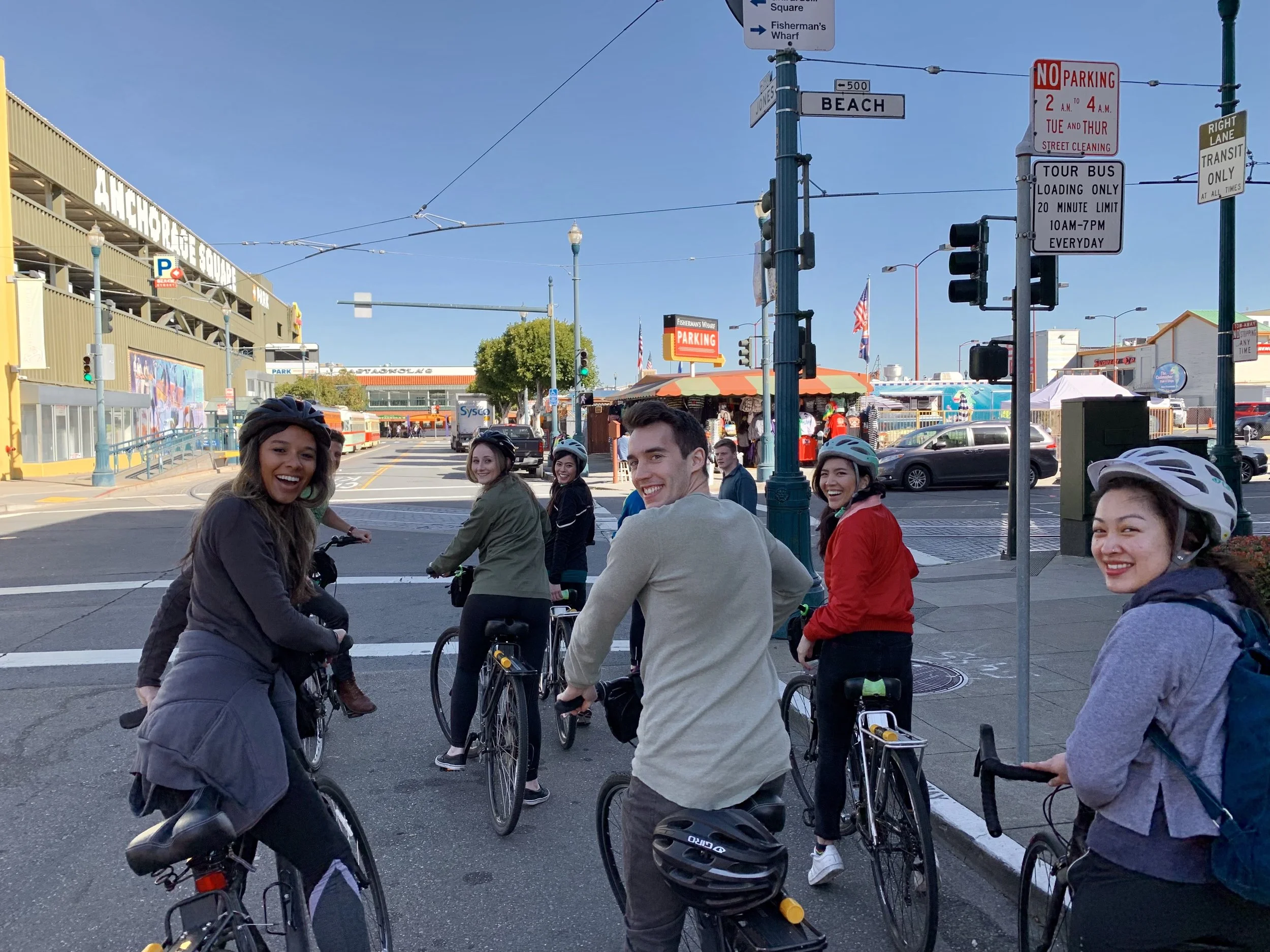Travel Physical Therapy – What You Need to Know, Part 2
Hanging out on a picturesque bridge in Amsterdam during Skip’s first trip abroad (besides the classic American trip to an all-inclusive resort, of course).
I’ve learned an incredible amount in my last three years as a traveling physical therapist.
But like most of you reading this, I had absolutely no idea what I was doing at the beginning of my travel PT journey.
This is my second post in this series of blog posts answering many of the common questions clinicians have about becoming a travel physical therapist.
If you missed the part one post, don’t forget to check it out here.
A quick note: I’m going to be specifically referring to travel physical therapy throughout this blog post. But much of this information applies to other travel healthcare professions, including travel nursing, travel occupational therapy, travel speech therapy, travel physical therapist assistant, travel occupational therapy assistant, and beyond.
In this post, I’ll be answering the common questions/concerns about travel physical therapy listed below. There are pro tips included throughout with important tips, tricks, and nuggets of wisdom I’ve learned along my travel physical therapy journey.
What’s your first day on assignment like as a travel physical therapist?
Starting a new job is A LOT to take in for anybody. And as travelers, we do it often.
My travel PT assignments have ranged anywhere from 6 weeks to 6 months, but they’re most commonly 13 weeks (about 3 months) at a time. So yes, starting a new job every 3 months is a new ball game and something you’re going to have to get used to.
Let’s make this clear up front – you will be overwhelmed for the first one to two weeks of your contract. Especially during your 2-3 contracts.
Picture this. In week one, you’ll be expected to:
meet new coworkers,
take on a whole new patient caseload,
learn your way around a new building,
master a new electronic medical record,
move and settle into a new city,
and tackle a new job.
I don’t want to scare you, because YOU’VE GOT THIS! I just want you to be informed going in.
It totally depends on the facility, but some places will expect you to jump in with a half to full-day caseload on day one.
Others will slowly ramp you up to a full caseload during the first week.
“It is absolutely KEY to ask the right interview questions to see if a facility is the right fit for you as a clinician. Be sure to ask what your orientation and caseload ramp-up will look like during your interview if this concerns you. ”
It is absolutely KEY to ask the right interview questions to see if a facility is the right fit for you as a clinican. Be sure to ask what your orientation and caseload ramp-up will look like during your interview if this concerns you.
During the first week of my first three assignments, I came home stressed and overwhelmed and would tell my wife “Jazz, I don’t know how much longer I can do this!” Maybe a little dramatic but that’s how I was feeling at the time!
But by week 2-3, I was always laughing that I’d ever said that. If you can just get through the first couple weeks, you’ll start to feel comfortable and realize it’s well worth the extra effort to make more money, explore a beautiful new area every three months, and take more than two weeks off per year.
Most of my anxiety during the first week stems from wanting to best serve my patients. Delivering quality care while learning everything on-the-go is no easy task.
I’ve learned to give myself pep-talks on the regular that I’m doing the best I can with the resources I have. After all, a newbie employee taking the reins is a hell of a lot better than patients not being seen period.
The first week jitters become more and more manageable with each contract you have under your belt.
My next contract will be number 11 and I’ll still get first-day jitters. But I’ll continue to DO IT AFRAID because I now know growth is always on the other side of fear.
PRO TIP: Commute to your facility a day or two before your first day of work as a test run. Trust me – this will take a ton of stress off of you on day one. The last thing you want is to be caught off-guard by traffic, struggle to find parking, take a wrong turn, etc.
Do you get treated poorly as a travel physical therapist?
First off – remember you’re doing these facilities a HUGE favor by stepping in to fill a staffing need.
You’re (1.) helping patients who are experiencing delayed care as their daily function is limited by pain, poor mobility, etc. AND (2.) helping the staff therapists who are probably doing everything they can to stay afloat with a crazy caseload.
At every single travel physical therapy job I’ve worked, my coworkers have been super appreciative that I’m there to help. And they’ve been more than happy to help me adapt to their system and field my questions about the electronic medical record, the building, equipment rooms, community resources, and shared patients.
My job experiences as a travel physical therapist as a whole have been 99% positive.
I’ve really only had a negative experience at 1/11 of my travel PT contracts to date. And surprise – it was my first contract.
A lot of that had to do with the fact that it was my first real-world outpatient PT job, which is just naturally stressful even when you’re not traveling.
But the fact that my director of rehab was a HUGE micromanager was the icing on the cake. I was not only trying to develop my own clinical skills as an outpatient therapist, but the DOR wanted me to bill, evaluate, and treat in a very specific manner.
His micromanaging led to me taking documentation home more often than I should’ve.
I’m confident my negative experience had a lot more to do with my own lack of setting boundaries than it did with the facility itself. If I had been a more confident clinician and set boundaries from the start, I’m positive it would have been a much different experience..
So yes, crappy travel therapy contracts exist.
Again, I can’t stress enough how important it is to ask the right questions during the interview to ensure you land at a good facility.
Here are some strategies to ensure your success as a traveler from day one:
Remember – first impressions matter. Be friendly, introduce yourself to everyone you can, and show that you’re happy to be there and ready to help in any way you can. The impression you make in your first week will build a foundation that will determine how the rest of the contract will go.
Don’t be that traveler that doesn’t care or only does things your own way. People will notice right away.
Don’t go around flaunting how much money you’re making. I would avoid the subject altogether if you can. You don’t have to tell people if they ask you, either.
Don’t fall victim to perm employees being jerks because of their own insecurities. Kill ‘em with kindness.
Build relationships with your coworkers. If you do, facilities will be sad to see you go and they will welcome you back with open arms if they ever need a traveler again. They might even try to convince you to take a permanent position. This has actually happened during the majority of my contracts.
PRO TIP: Being flexible, adaptable and a team asset is part of the travel gig. Be open to your facility’s way of doing things. You aren’t there to reinvent the wheel. Even if you don’t agree with the way they do things, you aren't going to move mountains in three months. BUT, if they’re expecting you to do something illegal/unethical, that’s another story. Reach out to your recruiter if shady stuff is going on. Your license may be on the line, after all.
What’s it like moving every three months for travel physical therapy contracts?
If you don’t already lead a minimalistic lifestyle, get ready, because travel therapy will teach you to.
When you move every three months, it’s crucial to pack light and keep the moving process as efficient as possible. The more stuff you bring, the more stuff you have to move every three months. And this will get old real fast.
You’ll learn quickly that you can live with a lot less than you think. Many short-term housing options will be furnished, anyway.
I wouldn’t recommend bringing furniture in a U-Haul or anything more than you can fit in your vehicle.
You can make a quick run to the dollar store to get anything you're missing when you arrive at your temporary home.
My wife and I have traveled with only one vehicle since the start. First, a Toyota Camry, and now our self-built Ram Promaster camper van.
I realize it might sound crazy, but everything you need should fit in one vehicle.
I recommend filling your trunk and keeping as little in the back seat as possible in case you have to stay somewhere overnight en route to an assignment.
You don’t want someone to see all your belongings inside your car and bust your window to steal your precious VitaMix.
I also recommend purging more and more stuff each time you go home / to your storage unit. It’s such a freeing feeling every time we get rid of more stuff and you’ll realize how little you really need the longer you travel.
Planning ahead and packing efficiently will save you so much stress in the long run. We’ve learned this one the hard way time and time again.
You’ll be a car Tetris master in no time!
1st pic: Jazz packing the trunk of our Toyota Camry to the brim. We call her the Car Tetris Queen. 💁🏽♀️
2nd pic: Our beloved self-built campervan, Beverly Ann the Van. Having a tiny home on wheels has been a complete game-changer for us.
How do I find short-term housing as a travel physical therapist?
We haven’t had many issues finding temporary housing over the last three years, but it can be a headache depending on location. Many of the rural areas won’t have as many options but you’ll have fewer issues when a major city is nearby.
Check out this blog post about short-term housing for a more in-depth look at our most used resources to find short-term housing during travel PT assignments.
I would recommend combing through the resources below PRIOR to accepting a travel contract. If you accept a contract and then look for housing, you may end up paying way more than you’d like. Or worst-case scenario, you can’t find housing at all and have to cancel the contract and start the whole process over.
Some resources we’ve used include (in order from most to least used):
Facebook Groups – Go into the Facebook group, then use the search bar to search the city you will be working in. If nothing pops up, search surrounding cities within a commutable distance.
AirBnb – If you can, message the property owner outside the app to see if you can book privately and avoid a bunch of extra fees. They’ll sometimes clear their calendar for longer-term stays if the place is currently booked up.
Craigslist — Be careful here. Scammers galore! Go tour a place (ideally in person, but Facetime works too) before providing any payment or personal information. Legit property owners won’t hesitate to get on the phone with you. If they won’t, RED FLAG.
VRBO or Zeus Living – We have never personally used either. It works like AirBnB but it’s usually more expensive than other options.
Extended Stay America – Same as above. A more expensive option in our experience.
Write and save a spiel into your notes app about who you are, what you do, important questions, etc. Then you can copy/paste it to several property owners and keep your fingers crossed that one of them works out!
Include a picture if you’re posting on FB groups to help the algorithm work in your favor and help them put a face to your name.
Here’s an example of what I’ve sent in the past:
Most places will require you put down a security deposit, so plan accordingly. We’ve had to pay a whole month’s rent upfront before (this is ridiculous for a three-month lease), but we’ve been able to talk most down to a more reasonable deposit ($200-500).
Be weary of places that want a bunch of your personal information. We’ve had landlords ask for our social security numbers and banking information before we even met them (for an application/background check). This same landlord treated getting on the phone with us as a big hassle. That's a huge red flag. Bye Felicia.
Remind pushy landlords that we are background-checked for each job we take. Some will accept copies of one. But most places love hosting travelers as we are professional and respectful people by nature and they know we make a decent wage.
Remember, everything is negotiable. It’s worth asking if you can talk your landlord down $100-200. As always, make sure you do it in a kind and respectable manner. And if they say no, at least you tried!
PRO TIPS:
Book an AirBnB or hotel for the first 1-2 weeks of an assignment and then go view places in person once you’ve arrived in the area.
Message AirBnB hosts about places even if they’re already booked during your stay as they may clear their calendar for a long-term guest.
Never give a security deposit or any personal information without meeting someone first (Facetime at the very least). There are so many scammers out there.
How do I find a gym / stay active when I move all the time?
If you love group workouts, a lot of our friends speak highly of CrossFit gyms and Orange Theory. I would love to try them, but these options don’t fit our budget.
I like to scope out and tour a gym – ideally on my route to work – to minimize commute time. Every gym I have toured has been willing to work out a short-term gym contract with me.
I’ve also opted to work out at home if there are no viable gym options nearby. I’ll alternate between doing HIIT/bodyweight workouts from my laptop/tablet and doing running workouts outdoors.
Running was an especially nice option when we lived a mile from the beach on the central coast of California.
Nothing quite like living less than a mile from the ocean. I went on beachside runs ALL the time when we lived in Grover Beach, CA.
I’m worried I’ll be lonely. How will I meet people on the road?
Okay, weekend warriors. You’ve survived your first week of a new contract. Work hard, play hard, AMIRIGHT?!
Once you get that Friday feeling, it’s time to hit the beach, the town, the *clurbs*, the national parks, or whatever your thing is. We personally love a mix of all of the above.
We live for new experiences. Exploring new areas and meeting people all across the U.S. is by far our favorite part of the travel physical therapy lifestyle.
Having a blast exploring San Francisco via bicycle with a group of travelers.
But wait, you likely don’t know anyone.... how do you even know what to do? You don’t even go here!
I always start by asking my coworkers and patients what the “must-dos” are while we’re in the area. Chances are they’ll know the majority of the hot spots to hit up. The locals know best, after all.
Just be sure to have an elevator pitch ready of your favorite hobbies, because I’m usually like “uh... everything” (just being honest) and then I get a whole slew of recommendations.
Create a note in your phone titled “[name of city] recommendations” and reference / add to it as coworkers and patients give you more recommendations.
You can also check out the apps/websites below to see what’s happening in your area. These can be hit or miss depending on the area you’re in (they're better in more populated areas).
MedVenture App – A networking app made specifically for healthcare travelers that makes it incredibly easy to meet other travelers based on your travel assignment location. You have to check it out!
Facebook events – You can search for all kinds of events in your location.
Facebook groups – Join travel healthcare groups like Travel Therapy Therapists and make a post asking if anyone is in your area and wants to meet up. Usually travelers near you are super down to hang!
You can also check out the AllTrails app for great hikes in the area if nature is more your thing.
PRO TIP: Make sure to do your research and at least roughly plan your weekend festivities during the week. We have a bad habit of waking up on Saturday morning and being like “So what are we doing this weekend?”, then we waste time having to do our research then. Often, we end up going to the beach because it’s what’s easiest if we leave it to the last minute.
PROTIP: Go to TravCon, an annual conference held specifically for healthcare travelers in Las Vegas every September. This is THE event to meet your travel fam. We went during my first assignment in 2018 and it completely changed the game for us in terms of finding a network of travelers throughout the U.S. Most of our closest friendships on the road lead back to this conference.
In Summary:
It’s absolutely imperative to ask the right interview questions to ensure you land at a good facility as a travel therapist.
Know that your first 1-2 weeks will be stressful, but also know that growth lies on the other side of the discomfort. Each assignment will make you a better clinician.
Remember, first impressions matter. From day one, be friendly, introduce yourself to people, and show that you’re happy to be there and ready to help in any way you can.
Be flexible, adaptable, and a team player from the start. They will love you for it.
I know you have great ideas, but don’t force them on your facility. You aren't going to reinvent the wheel during your three months there.
Pack lighter than you think you need to. It will lead to way less stress in the long run. Remember you have to move everything you bring every three months. Marie Kondo that shit!
Comb through all these short-term housing resources prior to accepting a travel contract. You want to be sure you can find housing that meets your needs / that’s within your price-range before you commit.
Everything is negotiable. Negotiate rent, ridiculous security deposits, etc. The worst thing they can say is no.
Use the interwebs to connect with other travelers around you. This will be easier in some places (west coast) than others. But we’re all connected nowadays if you know the right resources.
Go to TravCon next year to meet your travel family
Travel therapy is completely possible for you and you ARE ready.
There are SO MANY OF US out here traveling and living our best lives.
I know you’re scared. We were all scared shitless when we started.
But the best things in life are on the other side of fear.
Book a FREE coaching call with us if you need an extra push.
We’ll give you with the knowledge, confidence, and mindset you need to take the first step to life with more time and financial freedom.
We’re so stoked to help you get started on your journey!
